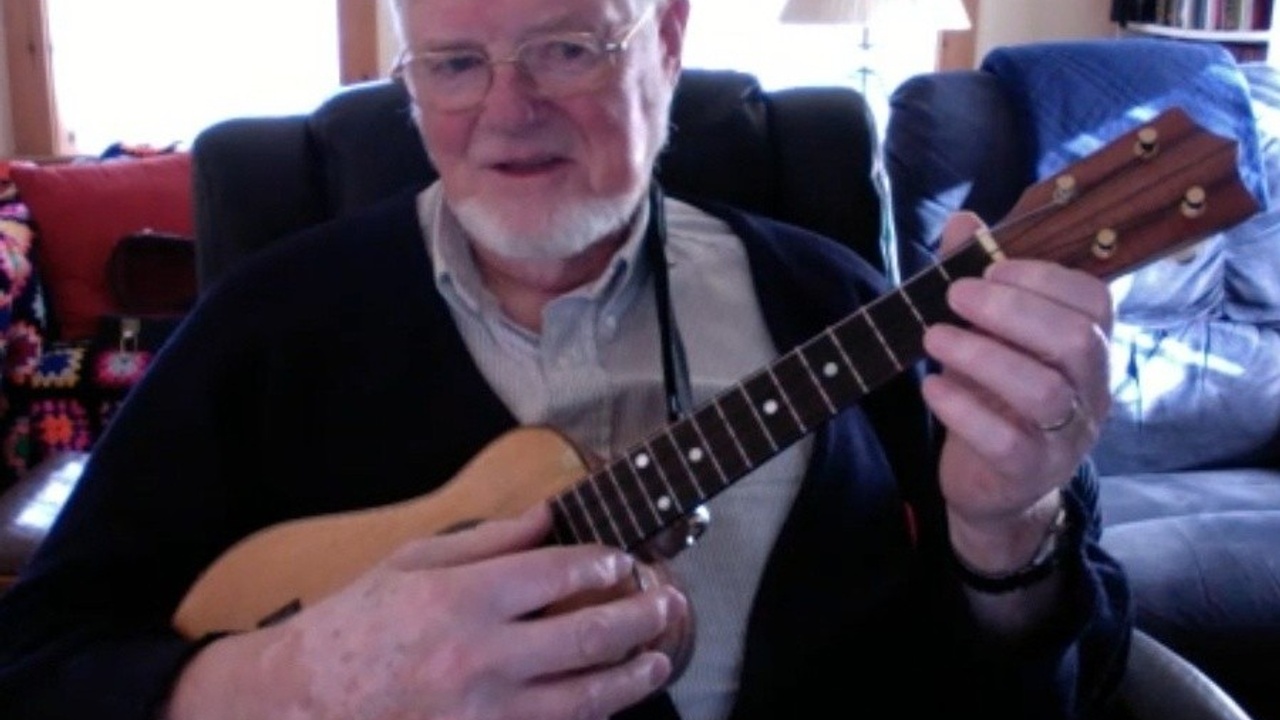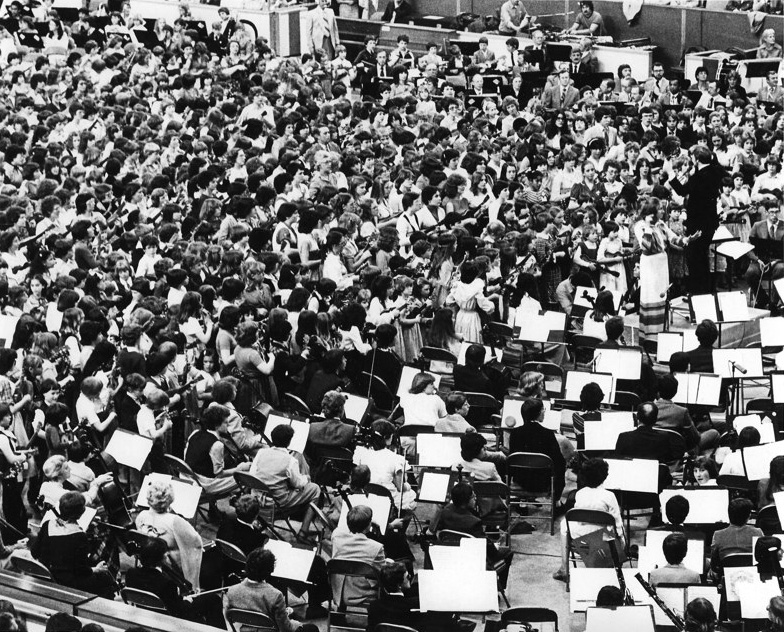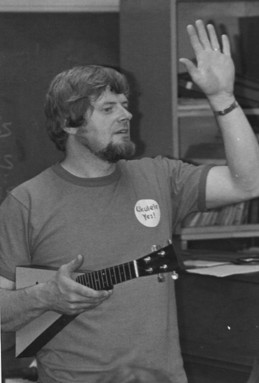The Godfather of Canadian Ukulele: J. Chalmers Doane (Part One)

The first of a two-part interview with Canadian ukulele education legend, J. Chalmers Doane, sharing the story of his own musical evolution and reflecting on bringing music education to thousands through this instrument for more than 50 years.
Not so long ago, Uketropolis Team Member Zsolt Schäfer had the opportunity to have a conversation with the man who introduced ukulele into Canadian music education. Here's part one of this delightful interview.
When was the first time you met the ukulele?
I think I was four when I got a cheap plastic ukulele. My mother played a little banjo ukulele, which would actually probably be quite a nice instrument. I have a picture of her playing in 1923 where she was on a beach. She learned probably half a dozen chords and played songs. That’s what I see of her background on the ukulele and she gave me the ukulele. Mum was fairly progressive. She came from Nova Scotia, which was very conservative, and she was brought up out in the country, going to school on a horse and everything. But she went to New York and got a job in a department store. She was she was not a person that sat around.
The 1920s, that was the first wave of the ukulele, so she played uke before George Formby did!
Yes, George Formby. He was very influential in my love of the ukulele because when I was very young, two or three years old, my brother and I had our own record player. We had one for the family too but this was our own record player. Anyway, we had a George Formby recording of Our Sergeant Major. I played it so much that I wore the whole thing out. It was an interesting thing, but I didn't have any ukulele lessons from anybody really for a long time. Mum just showed me two or three chords, and I went from there.
(If you're interested in learning the ukulele, then be sure to check out our online ukulele course here at Uketropolis!)
Did you just learn skills on other instruments, like guitar, and then transfer to the uke?
I didn't have a guitar but we had a piano and I started playing piano quite young. By the time I was four, my dad, who was not a musician, reported to mum one morning when they woke up, saying "I think that guy's playing a piece that I can recognize." She stopped and listened and said, "Yes, that’s right, he is!" My dad figured if I could do that without any help, maybe I should have lessons. So he arranged for me right away to start taking piano lessons.
You also play other instruments like clarinet and saxophone. Could you tell me about that?
Yes. Well, I've always been obsessed with instruments and when I was very young, my cousin had a trumpet. We got hold of that and tried to play it and of course couldn't do much. My brother and I, we didn't have any teachers or anything. I did continue playing on the uke and little by little, I started figuring out a little bit of how it could work and how it did work.
I still enjoy collecting and learning new instruments.
And I played the piano. I did not take classical piano lessons. I did not enjoy that, but I enjoyed the piano. So I developed my ear quite well. But I didn't come to be a pianist.
As for the other instruments, and I'm still the same way, I still enjoy collecting and learning new instruments. I play and I have a great interest in musical instruments.
How did you end up being the founder of Canadian ukulele education?
When I was a young person, I took a one-year course at a teacher's college and got a license to teach and I started teaching music. I was in a school where I was more or less the music person for the whole school so I started everything that I could. I had a string group: violin, viola, cello, bass, and I had a brass band: trumpet, trombone, E-flat alto horns, tuba, baritone horn, percussion, and sometimes string bass. I also had a girls double quartet going and a boys quartet going.
I did that for a while and then I decided to get serious about music and my wife and I and little girl moved to Boston, to be near Boston University where I majored on trombone. That was my problem: I had to major on something. I found a very good trombone teacher before I went there. After several years in Boston taking the degree I came back and I was appointed director of instrumental music for the city of Halifax.
Related Reading: Baritone Ukulele Tuning
 Chalmers Doane conducting at the Halifax Metro Centre (c. 1980)
Chalmers Doane conducting at the Halifax Metro Centre (c. 1980)
My plan was to start 30 or 40 kids on string instruments. So I started the little kids in grade three on violin and I had a little older kids on the viola. And I think I had three or four cellos and there were two string basses. Then in another school I started 20 violins. So I had enough to get a string program started and my goal was to have a symphony orchestra. I worked that for a while and then I started hiring staff. First person I hired was a violin teacher, so that made a total of four teachers for the city of Halifax.
Of course you asked about the ukulele, but the uke really didn't come at that time. I mean, I was still playing the ukulele and I used to play for the kids and do all kinds of things with ukulele. I had even been on television on the Sing Along Jubilee, which was a national program in Canadian television.
But then I discovered quite early that a lot of kids couldn't afford the time and had no background for learning the orchestral instruments. I didn't want them to be left out of the program and the guitar was inappropriate because it was too big. You can't start that in grade four and do a decent job. So I decided to start a ukulele program.
It was quite successful. Everybody liked it because it had melody, harmony, and lots of rhythm. By the way, all my groups from the beginning had a person playing percussion and I had a full drum set with every beginning ukulele group. I had very strong feelings about rhythm. I taught drummers what drummers are supposed to know and that is that we can't get along without them but they're not the main instrument. They're accompaniment instruments and they need to learn how to do it. I specialized on that and I produced about eight world-class drummers in my life too who play with the pop artists in Canada, on cruise ships, and all over the world.
Everybody liked it because it had melody, harmony, and lots of rhythm.
Anyway, I started the uke program, I did it the same way as I did the string program. The thing I tested with the kids first was interest, not music. Because they didn't know anything about music anyway. So I tested them with interest by having my meetings at weird times. If the parents didn't show an interest, they were out of luck.
When I finally got down to setting the times for these things, I didn't make them purposely inconvenient with the ukes, but I made them so they had to make a commitment in order to get in. One thing that used to happen, people would call me and ask, "Can we get in the group?" I was just dying to have more kids in my group. I called it the “A” group. I would say, "Well, they can't just get in like that. There's a waiting list and you'll have to wait a little while until there's an opening."
I wanted 40 kids in the group and I had 16 at the beginning who were potentials. The truth of it was there was no waiting list. I was desperate to get another 20 but I told people that they had to wait their turn. I spread the word and we started rehearsals right away with the 16 that I had. We had a set of drums and bass and these 16 kids, well, I started playing in public with them quite quickly and made sure that some people heard it.
It grew and I realized I had to have a lot of teachers to make this thing go. So I started an ensemble for adults, which I held every Monday night, and I found musical people who were interested. I pushed them hard and taught them basics so that they could do things. Then I opened up a course and they had to have a lesson with me every week. If they stayed interested and worked hard, after two years I would allow them to volunteer to teach in my program.

Now, there is your waiting list!
In two years I had quite a few teachers. Some weren't very effective but I put them as helpers with people who were. In those days, most women did not have full time jobs. They were very well-educated women in music and in every field. Out there, playing bridge and going to a class and the gym. They had all kinds of time on their hands. So I got them involved with teaching these kids as volunteers. We didn't pay them. Didn't have to as it was a privilege to be in the program and they had to audition to volunteer, if you can understand the psychology of that.
How did parents react to this?
Some parents were indifferent to music education for their kids but the kids really liked us. I made a point by treating every ukulele player just as seriously as I would an oboe player, or a violin or a clarinet or any of the other instruments that we were teaching. I treated them exactly the same in terms of importance but the content was geared to suit the background that the kids had.
I would say, "There's a waiting list and you'll have to wait a little while until there's an opening." The truth of it was there was no waiting list.
They didn’t have time to sit around and react because I made the thing move so fast that they were rushing to try to keep up to me. I kept that psychology going the whole time. I never had much flack from the school board because I had so many things going ahead of what they could think of that they hadn't time to deal with what was already going.
I expanded the program. I hired more teachers. I told them that their budget was inadequate and that they had to get serious about this thing. Just one little story on this: they introduced me to the financial man and the school system and I said. "So you have a music budget do you?" He said, "Oh yes, we do. We have $500." And I said, "Well, you had $500 because I spent that yesterday: I went to a store and I bought two tape recorders at $250 each and we started a listening program in the elementary schools. I need around 30 tape recorders in order to get this program going and I'm hiring a full-time person to maintain tapes so that every elementary child in the system can start listening to music. The $500 is gone and you can start getting ready for a budget of around $40,000 a year. That's what I'm thinking of."
Anyway, that was way back at the very beginning. I had written a plan for a five-year program as to what it might do. I started hiring teachers as fast as they'd let me. I hired one string teacher right away in the first week I was there -- violin -- and then I just kept going and I kept searching and so on. To make a long story short, when I retired 17 years later from that job, I had 54 full-time teachers and 10 part time teachers. It was a serious program.
Part two of the J. Chalmers Doane interview can be read here.
Stay in the Uke Loop!
Subscribe to the Uketropolis Gazette. Free arrangements, tips, interviews and more delivered to your inbox.


